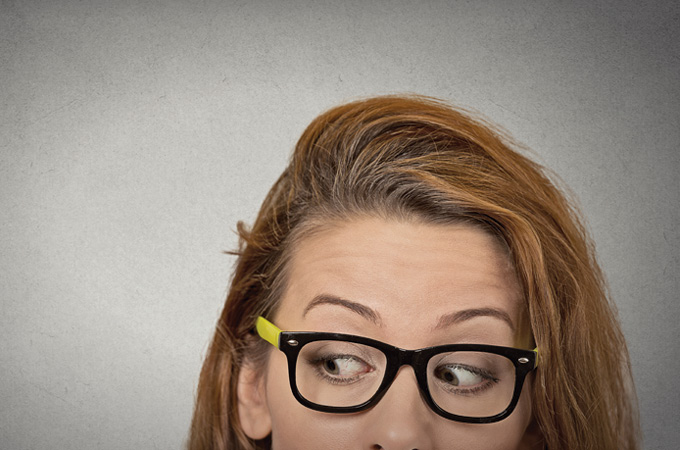From increased screen time to delayed exams to mask mishaps, COVID-19 has changed how we use our eyes to engage with the world. We talked with local experts about how the pandemic is impacting eye health and how you can address some common problems.
making an appointment
When the shutdown happened this spring, eye doctors’ offices were one of the medical facilities that were most commonly closed, according to SLUCare ophthalmologist Dr. Gabriela Espinoza. “We do a lot of routine eye care and checkups, so people didn’t want to take a risk by making an appointment,” she notes. “Even if people did want to see their doctor, a lot of offices were taking emergencies only, or if you needed something done to your glasses, the companies that work on frames and lenses were closed.”
Now, most offices are open, and Espinoza says it’s important that patients do not delay care. It can stop existing conditions from worsening or catch emerging problems. Increased screen time from working remotely also may have increased people’s awareness of vision problems. “Presbyopia is the loss of the ability to focus on nearby objects, and it’s a natural part of aging,” she explains. “People are looking more at screens that are at intermediate distance or close-up, so they may notice difficulty seeing that they wouldn’t during activities that rely more on focusing at a greater distance, such as driving.”
Washington University Physicians pediatric ophthalmologist Dr. Andrew Lee says kids should receive eye screenings at their annual checkup with their pediatrician. He adds that parents should consider making an eye appointment if they notice their children are:
- Developing headaches
- Complaining they can’t see
- Rubbing their eyes constantly
- Squinting a lot
- Experiencing misalignment of the eyes like crossing or drifting
breaking down blue light
A hot topic in eye health right now is “blue light.” It refers to light on the visible spectrum that has shorter wavelengths and more energy. The debate is whether it can have an impact on vision, especially from devices, and blue light filtering glasses are becoming more common. However, Lee says there is no evidence to indicate that it has any effect on eyesight. “You get more blue light from sun exposure than your computer or phone,” he notes. “Discomfort from looking at a screen usually is strain from focusing too long without blinking.”
Espinoza agrees that scientific data has not shown that blue light is damaging to human eyes. “It’s on the visible spectrum, but it’s right at the border of ultraviolet light, which is why it falls into the category of concern,” she explains. “Studies have shown short wavelength light can increase ocular melanoma in animals, but there is no evidence that using a blue light filter will prevent damage. Your eyes protect themselves
with the lens.”
reducing eye strain
While working and learning from home, we’ve been giving our eyes more of a workout by requiring them to focus for longer periods. This can lead to sore and burning eyes, blurred vision, headaches and more. Luckily there are measures that can ward off fatigue and give our eyes a break.
- Optimize your environment: Lee suggests setting up your work station with the screen at least an arm’s length away and oriented so you are looking slightly down. Espinoza adds that it’s important to have good lighting.
- 20/20/20: Lee recommends following this rule, which requires looking away from your screen at something 20 feet away for 20 seconds every 20 minutes. “It gives your eyes a break from focusing and reduces strain,” he explains.
- Adjust the brightness: Match your screen’s brightness to the surroundings.
- Magnify the screen: The bigger the font you’re reading, the less work your eyes have to do to focus. Espinoza also suggests avoiding low-contrast color schemes when it comes to your text and background.
fighting the fog
Anyone who wears eyewear has learned at least one thing during the pandemic: Masks make lenses fog. In the grand scheme of things, it’s an innocuous problem, and this annoyance shouldn’t keep anyone from wearing a mask. Here are some tips to help remain fog-free.
Why do glasses fog?
Warm breath escapes from the top of your mask and lands on the cooler surface of your lens, creating condensation.
How can you stop it?
- Fit your mask to your face. If you don’t have a mask that molds to the bridge of your nose, consider attaching a pipe cleaner. It offers the same effect as the bendable metal strip in medical masks. You also can adjust the ties or ear loops to ensure the mask is fitting snugly or use medical tape or an adhesive bandage to seal the top around the bridge of your nose.
- Wipe your lenses. Gently washing your glasses with soap and water may keep water droplets from building up and fogging the lenses.
- Pull up your mask. Wearing your mask over the bridge of your nose will allow the weight of your glasses to block the warm air’s escape. Alternatively, pushing your glasses forward on your nose will increase air circulation and cut down on the fog.
- Try an at-home anti-fog remedy. Along with soap and water, baby shampoo, toothpaste, vinegar and shaving cream are popular suggestions for fighting fog. The trick is adding enough of your chosen ingredient to stop condensation from building up while not blurring the lenses. However, special treatments on glasses to fight glare, scratches and smudges may make these remedies ineffective.
